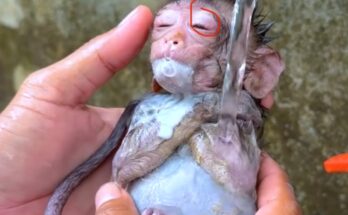Caring for a newborn monkey is a delicate responsibility that requires patience, compassion, and a deep understanding of the animal’s physical and emotional needs. Baby monkeys, like human infants, depend entirely on their caregivers for warmth, nutrition, security, and social development. Whether they are being raised in a sanctuary, rehabilitation center, or under the guidance of wildlife professionals, ensuring their healthy growth involves a combination of proper handling, appropriate nutrition, and a safe environment. Here are essential methods for keeping newborn monkeys healthy.
Provide a Warm and Secure Environment
Newborn monkeys cannot regulate their body temperature effectively, making warmth one of the first priorities. Caregivers typically use soft bedding, blankets, and heated pads to maintain a stable environment that mimics the comfort of their mother’s body. A quiet, secure space reduces stress and helps the infant feel safe. Minimizing loud noises, limiting unnecessary handling, and creating a calm atmosphere all contribute to healthy emotional development.
Offer Proper Nutrition
Nutrition is central to the well-being of infant monkeys. In professional settings, newborns are fed species-appropriate milk formulas designed to replicate the nutrients found in natural monkey milk. Feeding schedules are carefully monitored to ensure the baby receives the right amount at the right time. Holding the infant in a natural nursing posture during feeding encourages healthy bonding and reduces the risk of choking. As the monkey grows, caregivers gradually introduce soft foods under proper supervision.
Maintain Hygiene and Health Monitoring
Newborn monkeys require clean living spaces to prevent infections and illness. Bedding should be washed regularly, feeding equipment sanitized, and hands cleaned before handling the infant. In addition to basic hygiene, regular health check-ups—performed by qualified wildlife veterinarians—are essential. Monitoring weight, behavior, and physical condition helps caregivers detect early signs of health concerns. Prompt professional attention ensures that potential issues are addressed before they become serious.
Support Emotional and Social Development
Monkeys are social animals that rely heavily on interaction for healthy psychological development. For newborns raised away from their mothers, caregivers often provide gentle physical contact, soft vocal reassurance, and opportunities to interact with other monkeys once it is safe. These interactions teach essential social behaviors that the monkey will rely on throughout its life. Gradual introduction to peers helps the infant learn communication, play behavior, and social boundaries.
Encourage Natural Behaviors
As the monkey grows, it must learn the skills needed for independent living. Caregivers support this by encouraging age-appropriate activities such as grasping, climbing, and exploring. Providing safe objects to play with stimulates curiosity and motor development. In rehabilitation environments, natural enrichment—branches, leaves, and climbing structures—helps infants develop confidence and coordination.
Ensure Ethical and Responsible Care
Above all, caring for a newborn monkey requires ethical commitment. These animals should ideally be raised by trained professionals, as improper care can lead to serious health and behavioral issues. The ultimate goal in sanctuaries and rehabilitation centers is to support the monkey’s long-term well-being, whether that means integration with a troop, lifelong sanctuary care, or preparation for eventual release under expert guidance.



